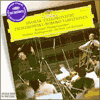Slava's Way
- Mstislav Rostropovich with Herbert von Karajan/Berlin Philharmonic: Dvorak: Cello Concerto; Tchaikovsky: Rococo Variations (Deutsche Grammophon 447413)
- Rostropovich, Richter, and Oistrakh with George Szell/Cleveland Orchestra and Herbert von Karajan/Berlin Philharmonic: Beethoven: Triple Concerto; Brahms: Double Concerto (EMI 66954)
One of the first things I do every morning is cast a glance at The Washington Post obituary page, and lately it seems as if the history of the 20th century, or at least a culturally significant portion of it, is passing before our eyes. Just in recent days we've said goodbye to a small assembly of seminal figures representing art and politics, among them film industry lobbyist Jack Valenti; the singer/actress Kitty Carlisle Hart; writer Kurt Vonnegut, who as a POW survived the firebombing of Dresden; Boris Yeltsin, former president of Russia; and Mstislav Rostropovich, the cellist and conductor whose musical and political influence extended across continents and decades.
Those of us who didn't observe the drama of Rostropovich's life and career, particularly his tenure as musical director/conductor of the NSO, have perhaps less of a sense of where he fits in the cultural and political history of the 20th century. He was a truly great cellist, to be sure, but also a larger than life figure -- and something much more.
If you haven't read any of the anecdotes about Rostropovich, they're priceless. There are some hilarious accounts of his sheer exuberance and irreverence (as well as a Michael Curtiz-like relationship to the English language). And who can forget Yo-Yo Ma's affectionate onstage mimicking of Slava-ese during the Kennedy Center Honors in December 1992?
But Rostropovich was not merely an accomplished but lovably eccentric musician. He put his career on the line to support Solzhenitsyn -- an act of artistic and political courage. Thank God both men lived to see the fall of the Soviet Union and the turning of the political and artistic tide, but that only came years after Rostropovich and his wife, the soprano Galina Vishnevskaya, shunned in their native country, had found a more welcoming community in the United States.
 Beyond his advocacy of political and artistic freedom, to say nothing of cultural and humanitarian projects, Rostropovich left an array of recordings representing a truly diverse repertoire. Do sit down with a CD or two, preferably to listen without interruption. Dragging other cellists into the equation is strictly optional but worth the effort for comparative purposes. If you have any Janos Starker on hand, or perhaps Yo-Yo Ma, bring them along.
Beyond his advocacy of political and artistic freedom, to say nothing of cultural and humanitarian projects, Rostropovich left an array of recordings representing a truly diverse repertoire. Do sit down with a CD or two, preferably to listen without interruption. Dragging other cellists into the equation is strictly optional but worth the effort for comparative purposes. If you have any Janos Starker on hand, or perhaps Yo-Yo Ma, bring them along.I've cheated here and picked not only what was accessible in term of current catalogues but also a good starting point for novices. The EMI recording in particular is a very attractive option not only due to the material but also the collaborations with David Oistrakh and Sviatoslov Richter. This is a keeper.
 Frankly, if I'm going to listen to Tchaikovsky or Dvorak, a soloist steeped in the romantic tradition would be my preference over the technically irreproachable but cool approach. Listen to Rostropovich's account and see if you don't agree.
Frankly, if I'm going to listen to Tchaikovsky or Dvorak, a soloist steeped in the romantic tradition would be my preference over the technically irreproachable but cool approach. Listen to Rostropovich's account and see if you don't agree.It would take another blog entry to begin to deal with the cello works Britten, Prokofiev, and Shostakovich, among others, composed for Rostropovich. For now let me just say that Rostropovich has at last returned home to his teachers Prokofiev and Shostakovich, and yet perhaps Russia alone couldn't contain his influence and spirit.




0 Comments:
Links to this post:
Create a Link
<< Home